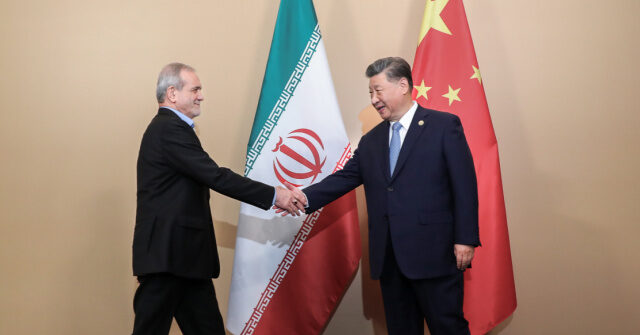Genocidal Chinese dictator Xi Jinping met Iranian President Masoud Pezeshkian on the sidelines of the ongoing BRICS summit in Russia on Wednesday, telling the leader that the Chinese Communist Party sought to “unswervingly develop friendly cooperation” with his country.
Pezeshkian, who answers to “supreme leader” Ayatollah Ali Khamenei, attended the summit representing Iran as one of the four new members of the BRICS coalition. The five original members of the bloc – Brazil, Russia, India, China, and South Africa – welcomed Iran alongside the United Arab Emirates (UAE), Ethiopia, and Egypt. Argentina and Saudi Arabia were also invited to become full members in 2024, but Argentina declined its invitation, while Saudi Arabia has reportedly neither fully accepted nor rejected the invite.
Russia billed this year’s BRICS summit as the largest high-level diplomatic gathering in the country’s modern history, boasting 33 nations participating, including several presidents and other heads of government. Participants published a declaration on Wednesday of the countries’ positions on various issues that featured clear Iranian geopolitical influence, including condemnations of human rights and other sanctions on rogue states and a demand for Israel to cease its counterterrorism activities in Gaza without condemning the Gaza-based terrorist attack in October 2023 that prompted a self-defense military operation.
That attack was organized by one of Iran’s most active and best-funded terrorist proxies, Hamas. Tehran has become directly involved in the conflict between Israel and Hamas, firing missiles and other projectiles at Israel unsuccessfully. The Iranian regime has been able to rely on Chinese support throughout its terrorist efforts and, Xi affirmed on Wednesday, would continue to be able to do so.
“The Chinese side supports Iran in safeguarding national sovereignty, security and national dignity, steadily advancing its own economic and social development,” Xi told Pezeshkian, according to the Chinese state news outlet Xinhua, “and improving and deepening good-neighborly and friendly relations with neighboring countries.”
Xi said his regime was “ready to work with Iran to firmly support each other, uphold the basic norms governing international relations such as non-interference in internal affairs, and safeguard the legitimate rights and interests of the two countries.” The dictator added that China was seeking to expand economic and cultural cooperation in addition to geopolitical solidarity.
Xi also reportedly specified that Beijing was “deeply concerned” about the Iran-fueled conflict in the Middle East but did not condemn Iran or even note its protagonist role in causing the war, instead demanding “an early ceasefire and end of war in Gaza,” where Hamas is headquartered.
Pezeshkian reportedly replied thanking China for its support and declaring the communist regime “Iran’s most important partner for cooperation.” He stated Tehran would back Chinese efforts in “opposing hegemony and bullying,” presumably by the United States.
Elsewhere at the summit, Pezeshkian used his time primarily to condemn the use of sanctions by free states to cut economic links with rogue regimes like his – a priority topic at the summit given host Russia’s status as one of the world’s most sanctioned countries.
“Coalitionism and efforts to create constructive and friendly relations are part of today’s reality and the demand of many countries and international players to get rid of unilateralism,” Pezeshkian declared in his remarks to the summit, according to the Iranian propaganda outlet PressTV.
The Iranian president lived up to his promises before the summit to prioritize condemnation of Israel as an issue at the event, as well as call for an end to the U.S.-led global order.
“The heads of state who will attend this summit will present their vision of BRICS. This event can eclipse the US unipolar world. BRICS is a way out of US totalitarianism,” Pezeshkian said before boarding his flight to Russia this week. “There will be a meeting of [the leaders of] BRICS member countries that seek to build a multipolar world.”
Ultimately, the presence of relatively pro-Israel India and Abraham Accords signatory the UAE did little to curb the anti-Israel language in the BRICS Kazan declaration.
“We reiterate our grave concern at the deterioration of the situation and humanitarian crisis in the Occupied Palestinian Territory, in particular the unprecedented escalation of violence in the Gaza Strip and in West Bank as a result of the Israeli military offensive,” the declaration read, calling for “an immediate, comprehensive and permanent ceasefire in the Gaza Strip.”
“We denounce the Israeli attacks against humanitarian operations, facilities, personnel and distribution points,” it continued, also condemning Israeli operations against Iran-backed Hezbollah in Lebanon.
China has been reliably supporting Iran throughout the ongoing conflict with Israel. China actively condemned some of Israel’s most effective operations in the conflict, including the elimination of Hezbollah chief Hassan Nasrallah in Lebanon.
“China opposes the infringement on Lebanon’s sovereignty and security, opposes and condemns any action against innocent civilians, and opposes any move that fuels antagonism and escalates regional tensions,” the Foreign Ministry said in a statement on Nasrallah.



